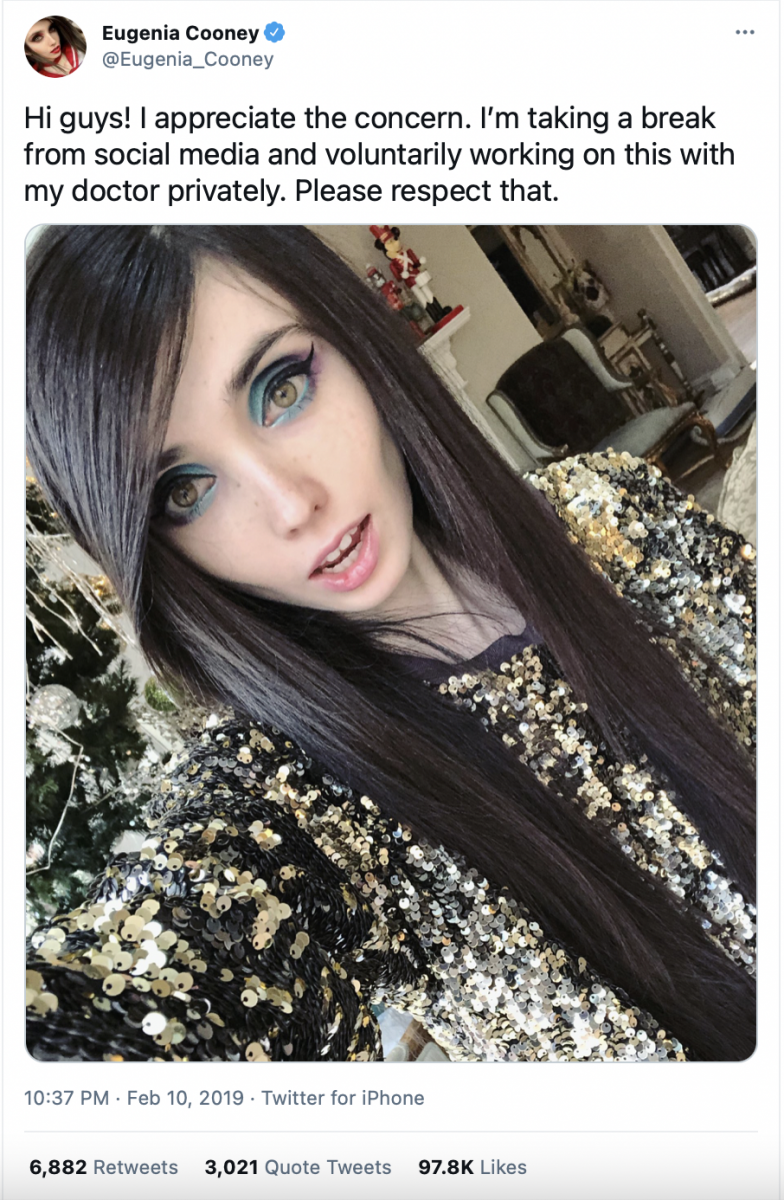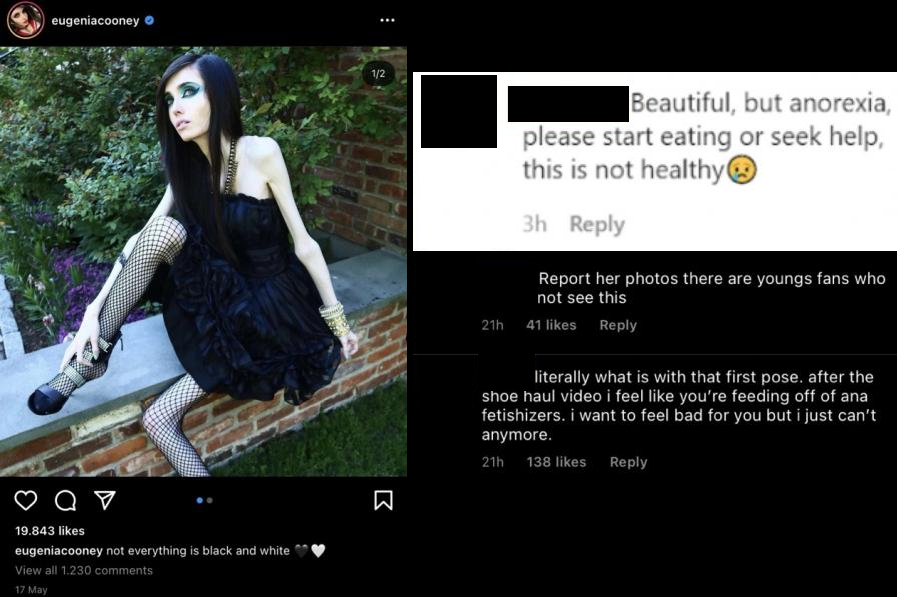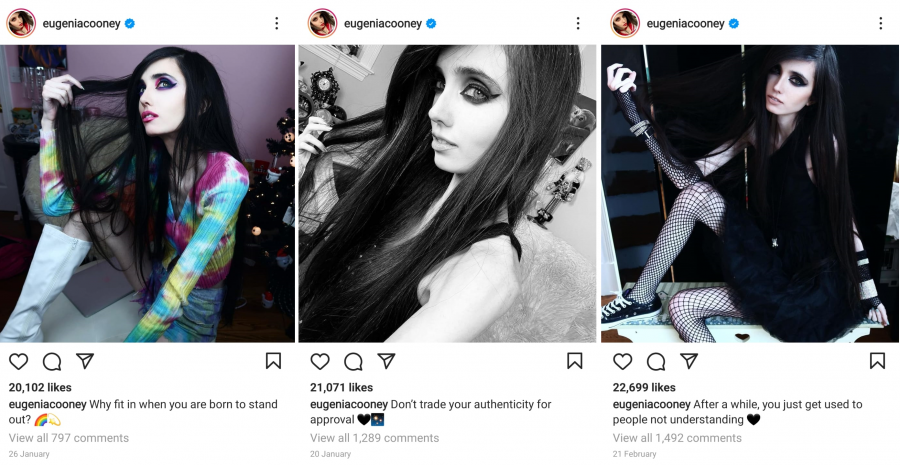
Eugenia Cooney: Youtube's representative of disordered eating
Trigger warning: This article contains mentions and pictures of an eating disorder that can be triggering to certain audiences
Eating disorders are by far the deadliest among all mental illnesses in the 21st century and Eugenia Cooney is an example of a social media figure suffering from one. The long-term mortality rate in the USA goes up to 20% (Tamburrino MB, McGinnis RA, 2002). Among all eating disorders, suicide is a common cause of death (Muhlheim, 2020). This disease can permanently damage the heart muscle, the reproductive system and cause bone loss as no system is immune to the effects of malnutrition (Ekern, 2019). Food restriction, the fear of gaining weight, and excessive exercise are most commonly associated with anorexia. The cause why one develops an eating disorder is often unknown. However, it is often attributed to a combination of societal, psychological, and biological factors (Mayo Clinic, 2018). Eating disorders are often a personal struggle, but with the emergence of social media platforms, they can become public spectacles. Individuals with eating disorders use their accounts to keep track of their evolution, find inspiration and hold themselves and others accountable.
In 2010, Tumblr became the most popular platform for users to exchange their desire to lose weight and exchange dangerous dieting tips. However, after Tumblr updated its terms and conditions in which they banned content that glorifies self-harm, pro-mia (pro-bulimia), pro-ana (pro-anorexia), or eating disorders in general, people who sought out that kind of content migrated to platforms like Instagram and Youtube (Restauri, 2012).
One individual who is often used as an inspiration to become thinner is the popular YouTuber Eugenia Cooney. Cooney amassed more than 2 million subscribers on YouTube, about 730k followers on Instagram, and roughly 90k on Twitch. Followers and digital bypassers speculated for years whether she suffers from an eating disorder or not. Her eating disorder, not disclosing which one she struggles with, was confirmed in February 2019 when she stepped away from social media and admitted herself into an eating disorder rehab program (Dodgson, 2020) (see Figure 1).

Figure 1: Eugenia Cooney on Twitter announcing her departure from social media.
After five months, she ended her short hiatus and since then regularly posts her usual content again - beauty vlogs, clothing hauls, and everyday life. Many people concluded that it was too early for her to expose herself to social media again. Cooney has, since then, returned to the same behaviour. Her insanely low weight and emaciated body is causing concern among her audience. Her comments are flooded daily with messages of concern (see Figure 2, comments 1 and 2).
Figure 2: Fans expressing their concern for her health in the comment section on an Instagram post.
For this paper, our analyzing tools will be based on concepts from Foucault's "Abnormal" (1975). This paper aims to explain how with the emergence of social media, Foucault's notion originating in the 20th century gained a deeper meaning and can still be relevant to explain phenomena about, in this case, the eating disorder community in the 21st century, focusing on the eating disorder from YouTuber Eugenia Cooney. We will analyze her use of power towards herself and her audience by comparing it to Foucault's multiplicity of "power" (1975). Foucault clarifies in "Abnormal" that power "need not be violent". His definition of power is "rationally organized and calculated" (p.xx). Lastly, we will showcase how she can be identified as a "dangerous individual" (1975), taking a closer look at her content and lack of action about serious incidents. According to Foucault, a dangerous individual is not someone who is dangerous because they committed a crime, but because of "what they are capable of". (p. xxiii)
How Eugenia Cooney uses the multiplicity of power
Foucault's theory about the modern structures of power rejects the idea that power represents only a repressive force that operates from above through law, taboo, or censorship (Foucault, 1990). Cooney's case reveals that in modern societies, the knowledge generated by human sciences provides a collective power to individuals who manifest it creatively through their bodies and their daily actions. Therefore, a relevant aspect is the power of social media over people's bodies and minds. By exposing the condition of her body as something ordinary to a large audience, on different platforms, without mentioning the potential repercussions, Cooney's eating disorder becomes an expression of harmful and dangerous power.
First of all, she demonstrates that the body provokes prototypical instincts such as sexual instincts. One of her followers commented on one of her posts: "literally what is with that first pose. After the shoe haul video, I feel like you're feeding off of ana fetishers. I want to feel bad for you but I just can't anymore" (see comment 3 on Figure 2). In this comment, a fan accuses Cooney of provoking anorexia fetishists with how she presents her body. Anorexia fetishists, as the name states, are people who are sexually attracted to severely underweight people. They fetishize their partner's eating disorder and are aroused by their emaciated bodies. The YouTuber, of Herbs and Altars, has uploaded a few videos where she talks about the sick and twisted minds of anorexia fetishists, and it is truly disturbing. In online forums, they fantasize about starving their partner to near death and write nauseating stories. Viewer discretion is advised as the videos are highly triggering.
Returning to Eugenia Cooney, we see this behaviour in her "MY SHOE COLLECTION 2021" video, where she constantly flashes her underwear to the camera. After many people complained, she claimed that she did not see it. However, this is questionable as YouTubers often spend hours editing their videos before uploading them (see Video 1). Through actions like this, she displays that she can still be in charge of her sexuality, as a side effect of eating disorders is often a decrease of sexual libido. She still possesses sexual power over others, even if it is mainly anorexia fetishists.
(Video 1: MY SHOE COLLECTION 2021, by Eugenia Cooney uploaded 07/05/21)
Second of all, her eating disorder has completely taken power over her. In a video where she reads hate comments, one can see her clear excitement about the comments that she gets. In none of her other videos, she is this visibly euphoric reading comments about her appearance by jumping around, multiple times flipping her hair, and the excitement in her voice. (see Video 2 until 8:25).
(Video 2: the worst Body Checking Video on youtube, by CreepShow Art uploaded 18/04/21)
Furthermore, Youtuber, CreepShow Art, found out that the comments she read were from a few months ago, and Cooney's screenshots were taken within 24 hours. Thus, CreepShow Art concludes that she keeps these hate comments as a personal keepsake and a way to validate her eating disorder. It is a sign of her power to know what she can put her body through.
Lastly, another example regarding her power would be the live streams from the platform Twitch. Twitch.TV is an American video live streaming platform. It has evolved much since its release, offering a broader range of content. Twitch offers interaction between the streamer and its viewers through a donation system, as viewers can donate money and write messages so that the streamer can read and interact with them (Wikipedia, 2020). During several streams, Cooney shows her viewers that she can lift a box full of her makeup products (see Video 3).
(Video 3: Eugenia Cooney Has Great Memory, But Even She Forgets Sometimes | Twitch September To October, 2020, by Love Eugenia Cooney uploaded 24/11/21)
Thus, at the same time she displays her body, her viewers can be more easily shocked and intrigued by the representation of her physique. In this way, the act has a double impact. She is demonstrating to herself that she can still lift heavy stuff and that she still holds physical power. At the same time, she manifests this power by receiving donations from viewers who are watching her stream, most of them fetishizing her anorexia or using her as an inspiration.
The dangerous Individual
Every single semi-famous person on the internet holds power over a specific public. Whether small or vast, Eugenia Cooney is in a position to alter the public's minds towards a very unhealthy lifestyle. Eugenia Cooney can be considered a dangerous individual and a risk to society, not only from her extremely thin appearance that she claims is natural but also from her denial of her health situation continuously brought forward by her viewership. Before 2019, Eugenia Cooney has constantly ignored rumours of having an eating disorder, making young followers believe that it is normal and doable to look like her while still remaining healthy. Like she claims in the clip below, she has always been naturally skinny. (see Video 4)
(Video 4: Eugenia Cooney Naturally Skinny, by EmoMoonlight uploaded 02/01/21)
Moreover, Cooney is also guilty of showcasing toxic positivity. Toxic positivity can have very damaging effects on oneself as you deny yourself to feel negative emotions. There is nothing wrong with feeling sad, frustrated, or angry but upholding the act that everything is perfect and that you are happy can take a toll on your mental health. Toxic positivity invalidates one's subjective experiences, which is why licensed psychotherapist Babita Spinelli compares it to gaslighting (Regan, 2021). Cooney captions her photos with quotes like "Why fit in when you are born to stand out", "Don't trade your authenticity for approval", and "After a while, you just get used to people, not understanding" (see Figure 3).

Figure 3: Concerning toxic positivity captions on Cooney's Instagram.
Taking a closer look at these captions, we can observe Cooney's confidence and positivity towards her body. From the picture, we can conclude that she is not affected by criticism. Thus, her followers start to desire her lifestyle because there seems to be nothing wrong with it. Followers who want to control their unhappy living situations will try to imitate her lifestyle. Eating disorders, mainly Anorexia Nervosa, is one's attempt at "mastery" in one area of life in an otherwise chaotic existence (Brunch, 1979, p. 64). The control over eating behaviours is a success in a world where they perceive themselves as failures (Ekern, 2020). However, they ignore the fact that it is very unhealthy and has severe lifelong side effects.
Her toxic positivity towards her condition can become a catalyst for developing an eating disorder for teenagers who do not know better. Cooney constantly negates and ignores the public's comments about eating. She gaslights her fans in an attempt to make them faithful to her behaviour. They are being manipulated into believing her rather than medical facts. Her devoted fan base will not tell her what she needs to hear because it might hurt her feelings, thus creating a destructive sequence of events leading to a toxic relationship with them. However, the main problem and characteristic of a dangerous individual that Cooney has is the influence over young kids. In this case, young followers might misinterpret the idea of just being different as living an extremely unhealthy lifestyle.
In this case, young followers might misinterpret the idea of just being different as living an extremely unhealthy lifestyle.
Cooney does not acknowledge any negative remarks on her appearance while continuously uploading on Twitch, YouTube, and Instagram. She acts indifferent towards hate comments and refuses to acknowledge that something might be wrong with her. This causes worry among the public as she normalizes her eating disorder. The issue we want to highlight is that it is essential to realize that her content is triggering. In an interview with Kati Morton, a licensed therapist who uploads videos about psychology on YouTube, they agree that mentioning numbers (weight, inches, etc.) is triggering (see Video 5). Hence, we conclude that Cooney is aware of what triggering content is.
(Video 5: 5150 - Eugenia Cooney's Story, by Kati Morton uploaded 07/01/20)
Nonetheless, she fails to put trigger warnings on her videos or photos. Therefore, she is consciously profiting from her videos and how they will trigger her audience. According to YouTube, her content does not violate any terms or conditions, but videos from commentary channels about her are often restricted or demonetized, as they discuss "sensitive" topics (Dogson, 2021). The platform YouTube should consider banning her videos or putting an age restriction on her channel. Furthermore, Cooney has been exposed for allowing anorexia fetishists to be MOD's (Moderator) on her Twitch Streams. Moderators are supposed to protect and be the most trusted person in one's community. Anorexia fetishists, whom we have seen, are sexually attracted to severely underweight people and thus cannot act as these protectors. On Twitch, they ask Cooney's audience for inappropriate photos of themselves and give them dieting advice.
A Reddit post called "Eugenia has Skeletons of Predators in Her Closet" (see Picture 2) exposes that Cooney had three confirmed predators as her MOD's. They are convicted felons and predators. The original poster (OP) also talks about their own experience with, as they refer to him, Predator 2. During that time, they were 14, and he was 29. Their conversation continuously became worse as he asked inappropriate sexual questions, asked for pictures, sent them gifts, and later harassed them when the OP threatened him with the police. Later on, the OP notified Cooney. However, she was already aware of this and still allowed the MOD to continue his dangerous behaviour. After it became public that one of the other MOD's is a registered child molester, it took Cooney two days to take action. She always claims that they are "nice guys". She completely disregards the trauma that is being put upon her fans through her channels. Her lack of action makes her dangerous to herself and others.

Figure 4: Reddit post which exposes Eugenia's MOD's as predators
Conclusion
All in all, we can say that Eugenia Cooney profits from these notions of emitting power through her mind and body and is a dangerous individual. She applies them to her advantage. She knows exactly how to manipulate her followers, keep her image viral and keep her fans hooked. Even though she does not publicly confirm her health issues, she uses social media to keep her body in control, which can be seen through body checks. More so, people's concern is a validation for her eating disorder. Eating disorders are often very competitive (Dodgson, 2019). A fellow Youtuber, named "of Herbs and Altars", who also struggled with an eating disorder, explains how the comments Cooney receives daily signal how great Cooney is at restricting herself. Thus, they are an encouragement for her to keep going.
Many factors play into Cooney's situation, and many of the ones we listed could be false. Moreover, we do not have the complete picture. However, with a big platform, she also holds much responsibility, especially with her younger audience. Cooney might not be fully aware of the consequences of her actions but that does not exempt her from being held accountable for her actions and behaviour.
So, how do Foucault's notions apply themselves to the eating disorder community in the 21st century? Firstly, being a dangerous individual in the eating disorder community is lethal. As we have seen with Cooney, her behaviour online alone is a danger to many impressionable teens. Thus, what Foucault wrote in 1975, "whose potential behaviour had to be subject to control and correction," applies to Cooney in the 21st century as well. Secondly, as Foucault already defined that power is not always violent, we can conclude that Cooney's use of power is often mental power over herself and others. These acts of power that she displays are again very misleading for her audience and dangerous. However, it is important to note that in this social media age, these notions have a more extensive reach than ever imaginable in the 20th century. Thus, they can commit even more harm.
References
CreepShow Art. (2021, April 18). the worst Body Checking Video on youtube [YouTube video].
Dodgson, L. (2019). An extremely thin YouTube star disappeared from the internet, but people with eating disorders are still getting “thinspiration” from her videos.
Dodgson, L. (2020). A YouTuber opened up about her friends forcing her into psychiatric hospital because of her eating disorder.
Ekern, B. (2019). Chronic and Long Term Effects of Eating Disorders in Adulthood.
Ekern, B. (2020). The Illusion of Control in the Development of Eating Disorders.
Foucault, M. (1975). Abnormal: Lectures at the College De France 1974–75 (2003–12-10) (First edition). Verso Books.
Foucault, M. (1990). The History of Sexuality, Vol. 1: An Introduction (Reissue ed.). Vintage.
Kati Morton. (2020, January 6). 5150 - Eugenia Cooney’s Story [YouTube video].
Love Eugenia Cooney. (2020, November 24). Eugenia Cooney Has Great Memory, But Even She Forgets Sometimes | Twitch September To October, 2020 [YouTube video].
Mayo Clinic. (2018). Anorexia nervosa - Symptoms and causes.
Muhlheim, L. (2020). Why Intervention Is Necessary to Prevent Eating Disorder Deaths.
Regan, S. (2021, July 9). What Toxic Positivity Actually Is (& Why You Should Avoid It).
Restauri, D. (2012, July 9). Tumblr to Pinterest to Instagram -- The Self-Harm “Thinspo” Community Is House-Hunting.
Tamburrino MB, McGinnis RA. Anorexia nervosa. A review. Panminerva Medica. 2002 Dec;44(4):301-311.
Wikipedia contributors. (2021, June 3). Twitch (service).